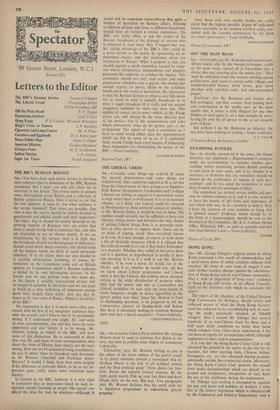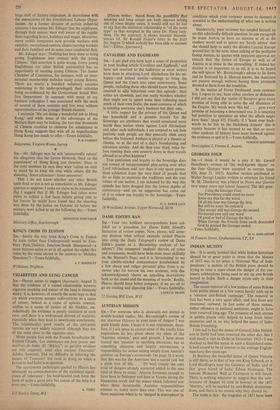HONG KONG SIR,—Mr. George Edinger's original article on Hong Kong
contained a few words of commendation and a good many more of unfair criticism suffused with emotion. His letter in your issue of August 9 con- tains further baseless charges against the administra- tion of Hong Kong and its non-Chinese community. May I, with an experience of forty years' residence in Hong Kong and service on its official Councils, reply to the strictures with which he concludes his letter?
The report of Dr. Hambro, of the United Nations High Commission for Refugees, should satisfy any unbiased person of what the Hong Kong Govern- ment has achieved in its overwhelming task of meet- ing the needs, practically unaided, of 700,000 refugees. May I remind Mr. Edinger that several hundreds of us non-Chinese lived for. three and a half years under conditions no better than those which refugees from China have experienced. I for one have no regrets for an experience which, although unpleasant at times, had its compensations.
It is true that the Hong Kong Cricket Club is still allo6ted the ground in the centre of the city for its matches, but other sporting clubs, Chinese, Indian, Portuguese, etc., are also allocated playing grounds, admittedly outside the commercial centre. Moreover, the Hong Kong Cricket Club sponsors the annual lawn tennis championships which are played on its ground and competitors, irrespective of race, have the use of the clubhouse during the tournament.
Mr. Edinger says nothing is attempted to regulate the pay and hours and holidays of workers. I refer him to the factory legislation which is administered by the Commerce and Industry Department, with a large staff of factory inspectors, in accordance with the conventions of the International Labour Organ- isation. As a former director of certain industrial concerns I can assure Mr. Edinger that the employees, through their unions, were well aware of the regula- tions regarding hours, holidays and wages. Moreover, many public companies now provide workers with canteens, recreational centres, clinics (serving workers and their families) and in some cases residential flats.
Mr. Edinger says: 'Nothing has been done to bring young Englishmen into contact with the young Chinese.' This assertion is quite wrong. Every young Englishman (or other British nationality) has an opportunity of meeting young Chinese. The Junior Chamber of Commerce, for instance, with an inter- national membership includes many young Britons. There are nearly a hundred voluntary societies ministering to the under-privileged, their activities being co-ordinated by the Government Social Wel- fare Department. In common with many of my business colleagues I was associated with the work of several of these societies and few were without representatives of the younger British element.
I maintain 'We are doing a wonderful job in Hong Kong,' and while some of the advantages of the Welfare State may be lacking, the fact that thousands of Chinese continue to clamour for admittance to Hong Kong suggests that with all its imperfections Hong Kong has much to offer.—Yours faithfully,































 Previous page
Previous page